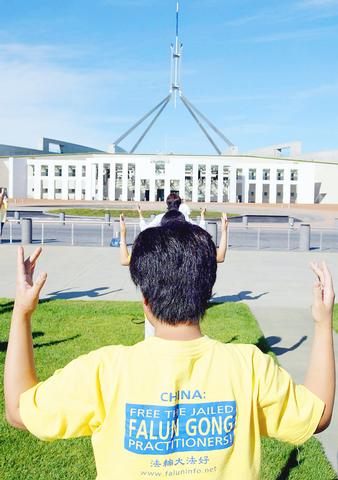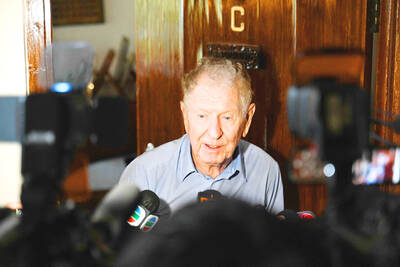Falun Gong practitioners and legislators accused the Australian government yesterday of caving in to Beijing in imposing a ban on protests by followers against the visit of Chinese Foreign Minister Tang Jiaxuan (
Tang held talks with his counterpart, Alexander Downer, who earlier invoked a diplomatic privileges law to ban demonstrations outside the Chinese embassy by supporters of the Falun Gong religious group.

PHOTO: AP
Australian Greens Senator Bob Brown accused the government of appeasing Beijing.
"On the very day the prime minister is flying to London to comment on the Zimbabwean election, we've got the foreign minister here shelving the right to protest as a minister from the communist regime flies in," Brown said.
Downer said he had a productive meeting with Tang, marking 30 years of diplomatic ties between Australia and the People's Republic of China.
"We've, during our discussions, reinforced the strategic relationship that exists between Australia and China in the Asia-Pacific region," he said.
"We've had productive dialogues -- everything from consular matters to our human rights dialogue."
Trade was believed to be the main talking point. Two-way trade has grown from A$113 million in 1973 to more than A$18 billion (US$9.36 billion) this year.
Tang appealed to Australia to be vigilant against the sect so it does not harm ties with China and said the issue of removing Falun Gong followers from the Chinese embassy was not about human rights or freedoms.
"Nor is it a question about the freedom of religious beliefs," he said. "Because Falun Gong is a downright, truly evil cult. These people should not be allowed to provoke trouble or create trouble any longer.
"It's our hope that people will be on a high alert against Falun Gong because they are not only creating trouble within China, they're now spreading the trouble to Australia," he said.
Falun Gong members in Australia delivered a letter to Tang urging an end to attacks on the group which was outlawed in 1999 after a large demonstration in Beijing.
China last week launched a fresh crackdown against the movement, raising concern among human rights activists.
"We're not trying to overturn the Chinese government, far from it," Falun Gong spokeswoman Esther Wang said.
"We have always made peaceful appeals and if the Chinese government had not started its crackdown, torturing people to death in labor camps because of their beliefs, we would not have demonstrated."
Wang said demonstrations have been held outside the Chinese embassy for nine months without incident and with official approval.
"Then suddenly they issued this certificate to make us take our banners down," she said.
Tang also warned the Australian government to ignore the Tibetan spiritual leader, the Dalai Lama, when he visits Australia in May.
Australia has already denied the Dalai Lama permission for a planned televised address in parliament's Great Hall, but Tang said Canberra's actions should go further.
"We have every reason to oppose the Dalai Lama and his followers in going to any country under any name to engage in activities aimed at separating the motherland and disrupting ethnic harmony and solidarity," Tang said.
"I also strongly oppose through any official figure, including those from political parties and their groups, in inviting or meeting with the Dalai Lama in any name or in any form."

US PUBLICATION: The results indicated a change in attitude after a 2023 survey showed 55 percent supported full-scale war to achieve unification, the report said More than half of Chinese were against the use of force to unify with Taiwan under any circumstances, a survey conducted by the Atlanta, Georgia-based Carter Center and Emory University found. The survey results, which were released on Wednesday in a report titled “Sovereignty, Security, & US-China Relations: Chinese Public Opinion,” showed that 55.1 percent of respondents agreed or somewhat agreed that “the Taiwan problem should not be resolved using force under any circumstances,” while 24.5 percent “strongly” or “somewhat” disagreed with the statement. The results indicated a change in attitude after a survey published in “Assessing Public Support for (Non)Peaceful Unification

The CIA has a message for Chinese government officials worried about their place in Chinese President Xi Jinping’s (習近平) government: Come work with us. The agency released two Mandarin-language videos on social media on Thursday inviting disgruntled officials to contact the CIA. The recruitment videos posted on YouTube and X racked up more than 5 million views combined in their first day. The outreach comes as CIA Director John Ratcliffe has vowed to boost the agency’s use of intelligence from human sources and its focus on China, which has recently targeted US officials with its own espionage operations. The videos are “aimed at

‘MISGUIDED EDICT’: Two US representatives warned that Somalia’s passport move could result in severe retaliatory consequences and urged it to reverse its decision Minister of Foreign Affairs Lin Chia-lung (林佳龍) has ordered that a special project be launched to counter China’s “legal warfare” distorting UN Resolution 2758, a foreign affairs official said yesterday. Somalia’s Civil Aviation Authority on Wednesday cited UN Resolution 2758 and Mogadishu’s compliance with the “one China” principle as it banned people from entering or transiting in the African nation using Taiwanese passports or other Taiwanese travel documents. The International Air Transport Association’s system shows that Taiwanese passport holders cannot enter Somalia or transit there. The Ministry of Foreign Affairs (MOFA) protested the move and warned Taiwanese against traveling to Somalia or Somaliland

Four former Hong Kong opposition lawmakers jailed in the territory’s largest national security case were released yesterday after more than four years in prison, the first among dozens convicted last year to regain their freedom. Former legislators Claudia Mo (毛孟靜), Jeremy Tam (譚文豪), Kwok Ka-ki (郭家麒) and Gary Fan (范國威) were part of a group of 47 public figures — including some of Hong Kong’s best-known democracy advocates — who were charged with subversion in 2021 for holding an informal primary election. The case fell under a National Security Law imposed on the territory by Beijng, and drew international condemnation and warnings